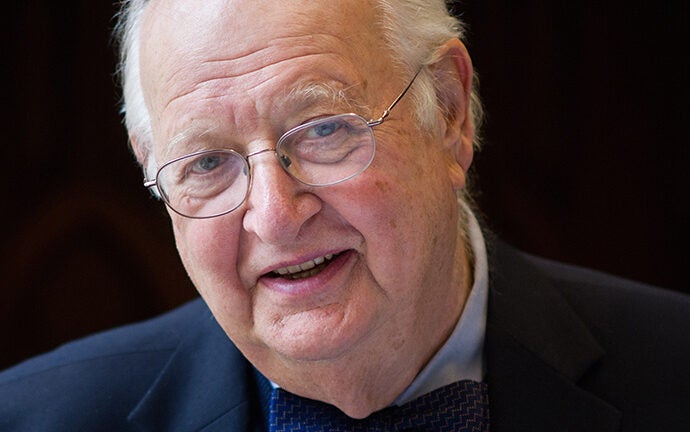
Nobel laureate Sir Angus Deaton named a Presidential Professor
Nobel Prize-winning economist Sir Angus Deaton has been appointed Presidential Professor of Economics by USC President C. L. Max Nikias. Best known for his research into poverty, inequality, health and well-being, Deaton will join the faculty at USC Dornsife in April 2017.
“Angus Deaton is a brilliant economist whose pioneering work on consumption, and how fundamental that is to our well-being, changed the face of economics,” Nikias said.
“Professor Deaton understands the importance of globalization, especially as it relates to prosperity and human rights, and that makes USC his ideal home. We couldn’t be prouder to welcome this esteemed Nobel laureate to our faculty, and to bolster our economics program with such a world-class scholar.”
The title of Presidential Professor is a rare USC honor bestowed upon an individual who combines the highest academic recognition with landmark contributions to society.
USC Provost Michael Quick noted that Deaton’s influential research and expertise in the effects of globalization will complement ongoing work at USC in combating societal challenges. “He has been at the forefront of economics, particularly with his work on reducing global poverty and income inequality,” Quick said. “We are honored to have him at USC.”
Deaton said he is looking forward to joining USC Dornsife.
“I have a lot of friends at USC, and there is a lot of very exciting stuff going on there,” he said. “I particularly like USC’s interdisciplinary approach. Mainly I will be concentrating on my longstanding research areas of health and happiness, and what could be better than that?”
In 2015, while at Princeton University, Deaton was awarded the Nobel Memorial Prize in Economic Sciences for his analysis of consumption, poverty and welfare. In awarding the prize, the Royal Swedish Academy of Sciences noted that economic policy intended to reduce poverty could only be designed once individuals’ consumption choices were understood.
Joshua Aizenman, Robert R. and Katheryn A. Dockson Chair in Economics and International Relations, professor of international relations and economics and chair of economics, said Deaton’s research has deepened our understanding of economic policy that promotes welfare and reduces poverty.
“Hosting Professor Deaton at USC facilitates the synergy with our research community, searching for effective policies in the era of volatility and adjustment to new technologies,” Aizenman added.
Deaton will work with the faculty at the USC Dornsife Center for Self-Report Science (CSS), the USC Dornsife Center for Social and Economic Research and the USC Schaeffer Center for Health Policy and Economics. His current research focuses on the determinants of health in rich and poor countries, as well as on the measurement of poverty and inequality in the United States, India and around the world. Deaton maintains a longstanding interest in the analysis of household surveys and the utility of randomized controlled trials.
“I am thrilled that Professor Deaton is joining USC,” said Arthur Stone, professor of psychology and director of the CSS. Stone has collaborated with Deaton for more than 15 years and has published many papers with him. “My firsthand experience is that he is a superb colleague and that he brings a wealth of expertise and experience to our teaching and research missions.”
Born in Edinburgh, Scotland, Deaton is the grandson of a Yorkshire coal miner and the son of a civil engineer whose battle for his own education led him to insist on high educational standards for his son.
Deaton was educated at Fettes College, Edinburgh, and the University of Cambridge, where he initially studied mathematics before falling by chance into economics — a subject he says he knew nothing about.
“I came to study economics completely by accident,” Deaton said. “But the combination I had of literacy and being interested in people and math is a very good one for economics.”
Deaton held academic appointments at the University of Cambridge and the University of Bristol in the United Kingdom before moving to the U.S. in 1983 to take up an appointment at Princeton University. He remains a professor emeritus at the Woodrow Wilson School of Public and International Affairs and the economics department at Princeton.
In December, he was knighted by Queen Elizabeth II for his “services to economics and international affairs.”
Deaton joins the ranks of four other USC faculty members who earned Nobel Prizes: Murray Gell-Mann, Presidential Professor of Physics and Medicine; Daniel McFadden, Presidential Professor of Health Economics; Arieh Warshel, Distinguished Professor of Chemistry, Biological Sciences, Biochemistry, and Chemical Engineering and Materials Science; and the late George Olah, Distinguished Professor of Chemistry, Chemical Engineering and Materials Science. Nobel Prize winner James Heckman is Presidential Scholar-in-Residence at the USC Schaeffer Center for Health Policy and Economics.